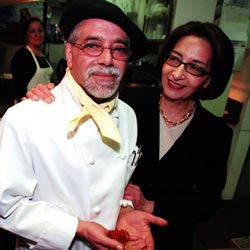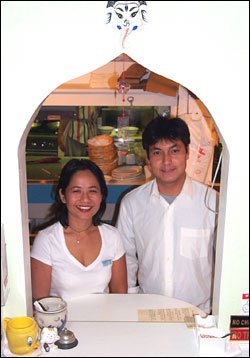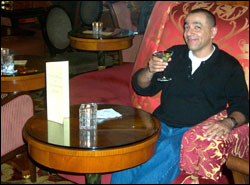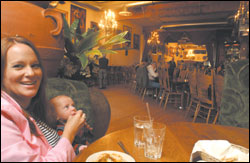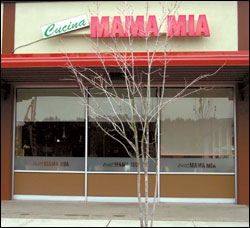After Napoleon invaded the Land of the Pharaohs in 1802, France was gripped by a craze for all things Egyptian—furniture and antiques, drugs (hashish) and food. Will the same thing happen here, as George W. Bush becomes the first Western ruler of an Arab country since colonialism’s sumptuous heyday? True, we don’t have much in the way of Iraqi culture to get hot about hereabouts; but Iraq’s neighbor Iran may be next in line for a compulsory freedom treatment, so why not beat the rush? When the food trendies start packing Alborz Restaurant in Redmond, you’ll already be a jaded habitu鮠
Alborz is not just Persian in cuisine. Its walls are decorated with calligraphic renditions, all red and black and curlicued, of verses by great Farsi poets: Rumi, Sa’adi, and Hafez. Classical calligraphy and kebabs? Sounds like an odd formula, but in the hands of chef/calligrapher Ali Rouhfar, Alborz is both a culinary delight and a fly-by-your-restaurant-seat tour of Iranian culture. In fact, Rouhfar spends as much of his time explaining the finer points of Iranian food and art to American diners as he does in the kitchen while his wife and two daughters serve up the food.
Before Iran’s Islamic revolution, Rouhfar presided over a chocolate manufacturing empire, producing German confections under license at factories in Mashad and Zanjan, northern cities known for their kebab culture. Cooking for friends and calligraphy were hobbies he indulged in his down time. He opened Alborz five months ago, and it has quickly become a forum for his dual arts of cooking and penmanship.
THE HEART of the menu at any Persian restaurant is the mouthwatering variety of Persian kebabs —different cuts of meat skewered and cooked over an open flame. That may seem like a simple formula, but there are as many ways to make a great kebab as there are calligraphic styles. Koobideh kebab ($6.95 for one skewer, $9.95 for two) is made with ground meat, marinated and spiced. Barg kebab ($17.95) is top-grade sirloin, thinly sliced.
Joojeh barg kebab ($12.95), on the other hand, consists of juicy chunks of chicken rubbed with saffron and lemon. Joojeh thigh kebab ($12.95) is a chicken kebab made with, voilଠchicken thighs. Joojeh koobideh ($10.95) is made with—right, ground chicken (see? You’re getting the idea!)—and is standard at kebab joints in Iran. Soltani kebab ($19.95) is a combo of a skewer each of beef barg and koobideh. (Soltani means “kingly,” from the Persian soltan—our “sultan.” The last soltan, or shah, was overthrown by revolution and died in exile, but that shouldn’t stop you from trying this excellent kebab. I loved Alborz’s—it’s the way to go for first-timers who want to try both barg and koobideh.
If you want to eat like an Iranian homie, ask your server for a raw egg and break it over your kebab before tearing into it. The result is called chello kebab, chello meaning—you guessed it, egg. Trendy Iranians eschew the practice, but it is still how kebabs are eaten at caravanseries and kebab houses all over the country.
All the kebabs are served on a bed of white basmati rice garnished with fragrant powdered sumac leaf, but devoted rice eaters are best off with the baghali polo, polo being Farsi for pilaf. Made with aromatic basmati rice, its green color comes from the mixture of lima beans and dill weed with which it is cooked. Alborz offers two varieties: baghali polo with chicken chunks ($9.95) and the vegetarian baghali polo maust-moosear ($9.95), flavored with lima beans and shallot- yogurt sauce. Baghali polo is delicate and easy on the tummy. Iranians consider it comfort food. A great vegetarian option and a staple at dinner tables all over Iran is ghorma bodemjon ($12.95): a lightly spiced eggplant stew.
Round off your meal with the dry, astringent Iranian tea ($1.85) Rouhfar brews in two samovars behind the counter. Ask for it to be served in fenjoon, traditional Iranian glass cups. Samovar culture in Iran is a nod to influence from Russia, Persia’s big neighbor to the north. But totally authentic is the dessert faloodeh ($3.95): thin rice noodles served in sugary rosewater—strictly for connoisseurs of the totally authentic, and not what your dentist ordered.
But then, Rouhfar is an artist as well as a chef, and Alborz is a poetic paean to his homeland as well as a place to eat. “A loaf of bread, a jug of wine, and thou” was Omar Khayy᭧s idea of a meal. Very Persian of him. In today’s Iran, wine is outlawed, bread is in short supply, and love is a crime punishable by public stoning—at least until we go in and straighten things out. Now that you can’t eat French food without getting on a government watch list, why not polish your Persian palate at Alborz? They don’t have their wine license yet, but that, too, is only a matter of time.
